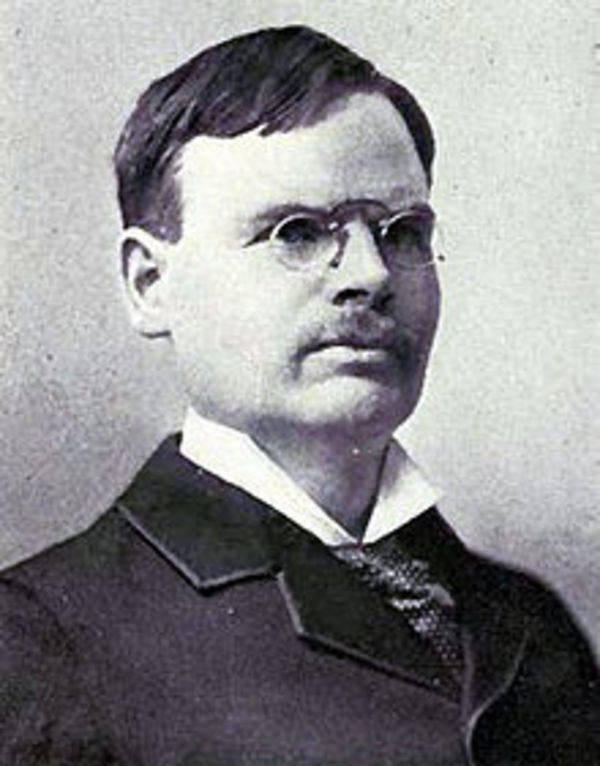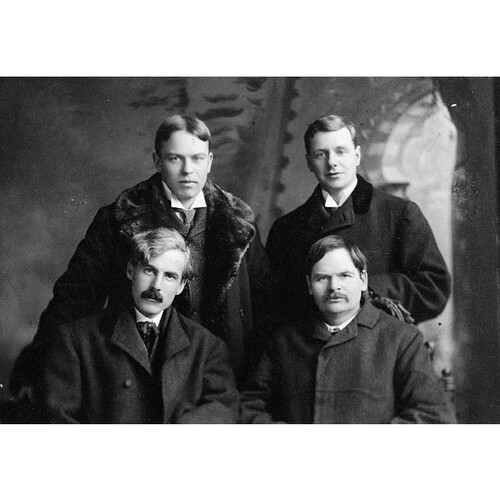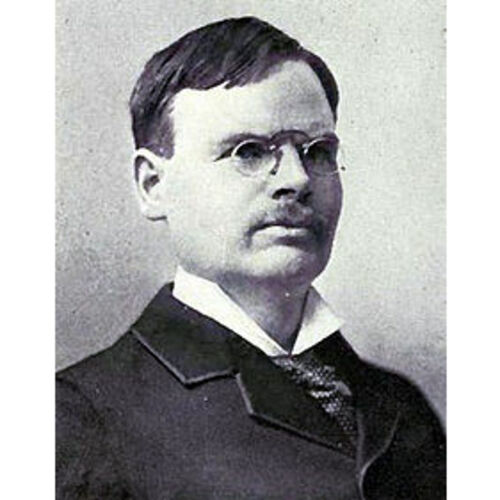
Source: Courtesy of Wikimedia Commons
CAMPBELL, WILLIAM WILFRED, Church of England clergyman, poet, writer, and civil servant; b. probably on 15 June 1860 in Newmarket, Upper Canada, second of the five sons to survive childhood of the Reverend Thomas Swainston Campbell and Matilda Frances Wright; m. 6 Oct. 1883 Mary Louisa DeBelle (Dibble) in Walkerton, Ont., and they had three daughters and one son; d. 1 Jan. 1918 in Ottawa.
Thomas Swainston Campbell served at Farmersville (Athens) and Meaford in Upper Canada before moving to Wiarton in 1871 and founding Trinity Anglican Church. An educated man with an eclectic curiosity, he was relieved of his charge in 1876, apparently because of his taste for alcohol. Matilda Frances Campbell was a gifted pianist and composer who played the harmonium for church services and conducted a choir that, in 1871, consisted of Wilfred, his brother Herbert, and another boy. After spending his formative years in Wiarton and finishing high school in Owen Sound in 1879, Wilfred taught in country schools near Wiarton. In 1880 he entered University College at the University of Toronto; from 1882 to 1883 he attended the Protestant Episcopal Divinity School (which in 1885 became Wycliffe College) in Toronto, and from 1883 to 1885 he was enrolled at the Episcopal Theological School in Cambridge, Mass. In July 1885 he was ordained deacon in the Protestant Episcopal Church and became rector of a parish in West Claremont, N.H. That fall he surprised his congregation by bringing his wife to West Claremont. Mary Louisa DeBelle had taught in the Wiarton area since 1883; she and Wilfred had kept their 1883 marriage secret, perhaps because Wilfred was not able to support a wife and she would not be allowed to teach if it were known she was married.
Campbell was ordained to the priesthood on 7 July 1886. He and Mary and their baby daughter remained in West Claremont until September 1888. He then took up a more lucrative position in St Stephen (St Stephen-Milltown), N.B.; by the time he left there in the fall of 1890 he had two more children. His last charge, in Southampton, Ont., was short and acrimonious; the congregation’s failure to pay him compounded his frustration with clergy life, changing faith, and faltering health. He moved his family to Ottawa early in 1891, planning to take up a civil service job he had been offered.
By 1891 Campbell was a well-recognized poet whose work was featured in the most prestigious magazines on the continent. He may have begun publishing his work while he was still teaching school; his first booklet, Poems!, seems to have been printed at a newspaper office sometime around 1879 or 1880. At the University of Toronto he started publishing poems in the Varsity in 1881, and his work began appearing in American periodicals in 1885. His first book, Snowflakes and sunbeams (1888), was favourably reviewed in Canada and the United States for its lovely nature lyrics, one of which, “Indian summer” (it starts with “Along the line of smoky hills / The crimson forest stands”), remains among the most beloved of Canadian poems. The poems in Lake lyrics and other poems (1889), with their intense rhythms, dramatic imagery, and ardent spirituality, express Campbell’s devotion to nature as the revelation of God’s presence; this book established his reputation as “laureate of the lakes.”
In Ottawa the promised job did not materialize, but in May 1891 Sir John A. Macdonald* hired Campbell as a temporary clerk for $1.50 per day in the Department of Railways and Canals. In April, Campbell’s poem “The mother” had appeared in Harper’s New Monthly Magazine (New York); it created a sensation in the literary press and was reprinted in newspapers such as the Week and the Globe in Toronto. In September, the House of Commons (and, in 1892, the Senate) debated whether Campbell should receive a permanent civil service position in recognition of his literary abilities. The proposal was defeated, ostensibly for practical reasons, and the decision established a precedent for withholding patronage from artists. Nevertheless, in 1893 he was quietly given a permanent position in the Department of Militia and Defence, and he would remain a civil servant until his death.
From 6 Feb. 1892 until 1 July 1893 Campbell and fellow civil servants Duncan Campbell Scott* and Archibald Lampman* wrote “At the Mermaid Inn,” a column of essays on literary and other topics in the Globe. One motive for starting the column was to help Campbell make ends meet (he now had a fourth child); one reason for discontinuing it, apart from its being “pretty well played out,” was that the others found it difficult to keep a rein on Campbell’s frank expression of his heterodox opinions. Readers attacked the Globe after Campbell outlined the history of the cross as a mythic symbol, and his apology for overestimating their intellectual capacities did little to redeem him in the eyes of either the Globe or his fellow contributors to the column.
In 1893 Campbell published his second book of poems, The dread voyage, somewhat darker in tone than Lake lyrics. In this volume, his poetry began to show the preoccupation with harmonizing religion, science, and social theory that had started while he was still a clergyman and would continue through his middle age. In 1895 he wrote the first two of his seven emotional verse dramas, Mordred and Hildebrand (published as Mordred and Hildebrand: a book of tragedies (Ottawa) in 1895 and republished with two others, Morning and Daulac, in Poetical tragedies in 1908).
Campbell had been elected to the Royal Society of Canada in 1894, and he served as vice-president (1899–1900), president (1900–1), and secretary (1903–11) of section ii, enjoying the last office in particular because of the constant exchanges with the men who came to interest him most, philosophers, historians, and political theoreticians. Friendships with men such as the Duke of Argyll [Campbell], Lord Grey, Nicholas Flood Davin*, William Dawson LeSueur, Charles Albert Edwin Harriss*, and Robert Tait McKenzie* fed Campbell’s passion for the British empire and his developing ideas about art, human evolution, ethnology, and genealogy. These interests are apparent in Beyond the hills of dream (1899), though the collection is largely lyrical, but by the time Campbell published Collected poems (1905), patriotism and imperialism were central to his religious faith, his life, and his works. In “Life and letters,” a column written for the Ottawa Evening Journal between August 1903 and June 1905, Campbell worked out ideas influenced by authors such as Richard Maurice Bucke*, John Fiske, LeSueur, and Sir Daniel Wilson*, as well as Shakespeare, Matthew Arnold, and other literary figures; these ideas would form the foundation of his philosophy for the rest of his life.
Campbell had transferred from Railways and Canals to the Department of the Secretary of State in 1892, obtained a permanent post in the Department of Militia and Defence in 1893, and then moved in 1897 to the Privy Council Office. In 1908 he would finally find a suitable niche in the archives branch in the Department of Agriculture. Although he remained a clerk throughout his civil service career, he regarded his writing as his real calling.
Campbell’s patriotism and his passionate interest in history influenced the text he wrote to accompany Thomas Mower Martin*’s paintings in Canada (1907), and these ideals inspired him to write three novels – Ian of the Orcades (1906), A beautiful rebel (1909), and “Richard Frizzell,” serialized in the Christian Guardian (1909–10) – as well as a descriptive work, The beauty, history, romance and mystery of the Canadian lake region (1910, 1914), and the first volume of The Scotsman in Canada (1911). Imperialist principles guided his choices for Poems of loyalty by British and Canadian authors (London, 1913) and for The Oxford book of Canadian verse (Toronto, 1913). Much of his own poetry in this period arose from his political and philosophical preoccupations. Sagas of vaster Britain (1914) was his last book, but each New Year’s from 1915 to 1918 he distributed pamphlets of poems relating to World War I. During the war he was seconded from the archives branch, where he had worked on projects relating to the loyalists, heritage buildings, Glengarry County, Ont., and other historical matters, to the Imperial Munitions Board, where he started to write a history of the Canadian munitions industry. He died of pneumonia on 1 Jan. 1918.
Campbell’s popularity died with him. Technically, his work is usually conservative, and his ideas have become unfashionable. His poetry has been compared with the more polished works of Sir Charles George Douglas Roberts*, William Bliss Carman*, Duncan Campbell Scott, and Archibald Lampman, principally because these men were all born between 1860 and 1862. In fact, Campbell worked hard to achieve naturalness, sincerity, and simplicity of expression, rather than polish; he tried to convey universal truths in order to inspire his readers to strive toward their noblest ideals. Within this framework, the artistic merit of many of his poems becomes evident.
Campbell’s strongest influence on his contemporaries was political. He met William Lyon Mackenzie King* in 1901, when his elegy “A Canadian Galahad” for King’s roommate, Henry Albert Harper*, appeared in the Ottawa Evening Journal. The poet and the politician inspired one another in matters intellectual, spiritual, and political; indeed, neither man made clear distinctions among these fields. A few days after Campbell’s death, their mutual friend the Reverend William Thomas Herridge described Campbell as one who was able to “direct human powers into the broadest channels, and to reveal the solemn beauty and grandeur of life.” William Douw Lighthall* recalled for the Royal Society how Campbell entertained his many friends with his “overflowing fund of historical and literary knowledge, recollections of travel, and many original theories.” William John Sykes, Campbell’s literary executor, summed up the effect Campbell had on his associates: “Life seems poorer, more conventional, and commonplace since he is gone.”
William Wilfred Campbell’s major publications include Snowflakes and sunbeams ([St Stephen (St Stephen-Milltown), N.B.], 1888; repr. Ottawa, 1974); Lake lyrics and other poems (Saint John, 1889); The dread voyage: poems (Toronto and Montreal, 1893); Beyond the hills of dream (Boston and New York, 1899) and (Toronto, 1900); Ian of the Orcades; or, the armourer of Girnigoe (Edinburgh and London, 1906) and (New York, 1906); The collected poems of Wilfred Campbell (New York, 1905; also published in Toronto the same year as The poems of Wilfred Campbell, with The collected poems appearing on the cover); the text which accompanied Thomas Mower Martin’s illustrations in Canada (London, 1907); Poetical tragedies (Toronto, 1908); A beautiful rebel: a romance of Upper Canada in eighteen hundred and twelve (Toronto, 1909) and (New York and London, 1909); The beauty, history, romance and mystery of the Canadian lake region (Toronto, 1910; new ed., 1914); vol.1 of The Scotsman in Canada (Toronto, 1911); Sagas of vaster Britain; poems of the race, the empire and the divinity of man (Toronto, 1914).
Editions of his works include The poetical works of Wilfred Campbell, ed. W. J. Sykes (London, [1922]); At the Mermaid Inn: Wilfred Campbell, Archibald Lampman, Duncan Campbell Scott in the “Globe” 1892–3, ed. Barrie Davies (Toronto, 1979); “The collected poems of William Wilfred Campbell,” ed. Laurel Boone (phd thesis, Univ. of N.B., Fredericton, 1981); and William Wilfred Campbell: selected poetry and essays, ed. and intro. Laurel Boone (Waterloo, Ont., 1987).
QUA, Lorne and Elizabeth Pierce Coll. of Canadian mss, W. W. Campbell papers. Laurel Boone, “Evolution and idealism: Wilfred Campbell’s ‘The tragedy of man’ and its place in Canadian intellectual history,” Studies in Canadian Lit. (Fredericton), 8 (1983): 93–116, and “Wilfred Campbell reconsidered,” Canadian Lit. (Vancouver), no.94 (autumn 1982): 67–82. C. F. Klinck, Wilfred Campbell: a study in late provincial Victorianism (Toronto, 1942; repr. Ottawa, 1977).
Cite This Article
Laurel Boone, “CAMPBELL, WILLIAM WILFRED,” in Dictionary of Canadian Biography, vol. 14, University of Toronto/Université Laval, 2003–, accessed December 22, 2025, https://www.biographi.ca/en/bio/campbell_william_wilfred_14E.html.
The citation above shows the format for footnotes and endnotes according to the Chicago manual of style (16th edition). Information to be used in other citation formats:
| Permalink: | https://www.biographi.ca/en/bio/campbell_william_wilfred_14E.html |
| Author of Article: | Laurel Boone |
| Title of Article: | CAMPBELL, WILLIAM WILFRED |
| Publication Name: | Dictionary of Canadian Biography, vol. 14 |
| Publisher: | University of Toronto/Université Laval |
| Year of publication: | 1998 |
| Year of revision: | 1998 |
| Access Date: | December 22, 2025 |




